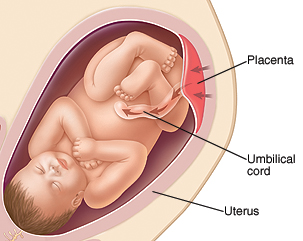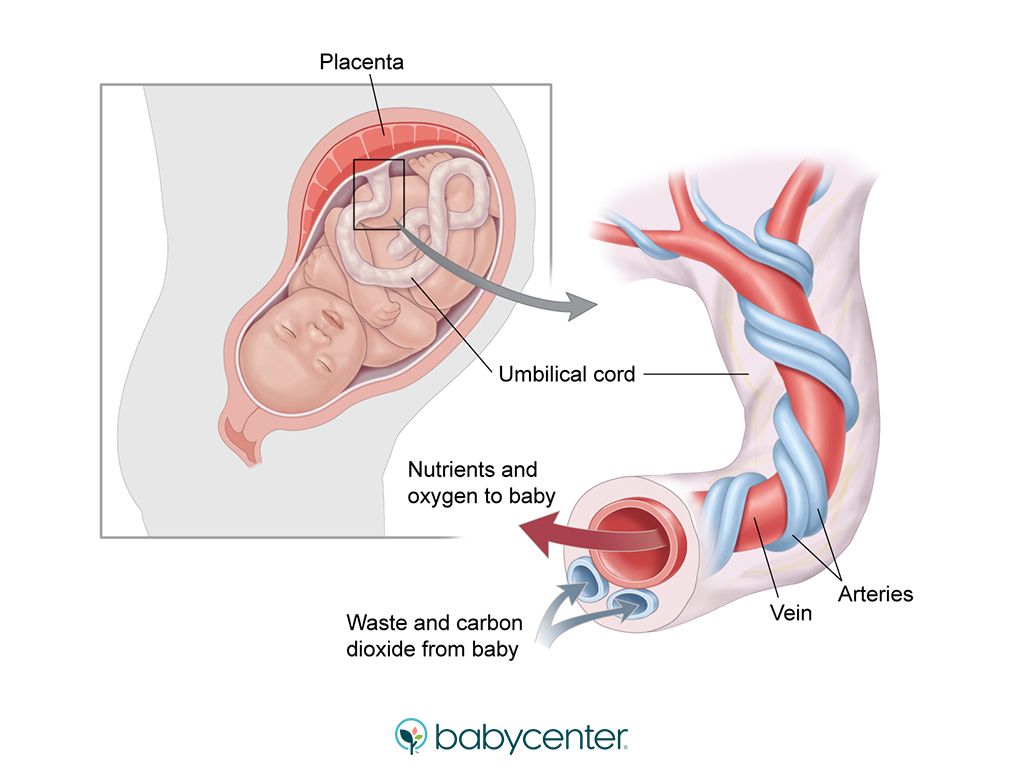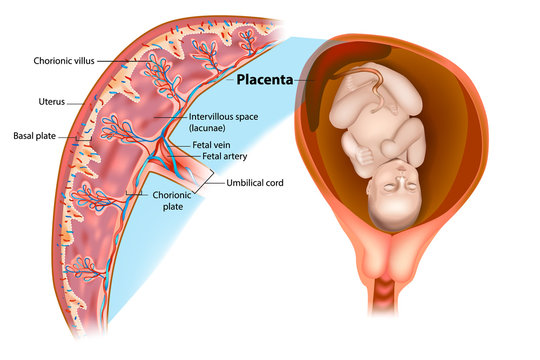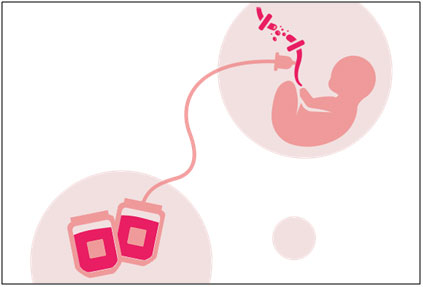Placenta & Umbilical Cord
25th September 2021
During the 9-months of pregnancy, a mother's body undergoes several changes. Soon after conception, along with the baby, the placenta and umbilical cord begin to develop in the mother's uterus. These two organs are the baby's support system and play a significant role in sustaining a healthy pregnancy. Here's everything you need to know about this support system.
What are the placenta and umbilical cord?
The placenta is a temporary organ that absorbs nutrients and oxygen from the mother's blood and transports it to the baby. It also transfers the baby's waste products and carbon dioxide back to the mother for excretion.
The placenta secretes several hormones, such as estrogen, progesterone and human placental lactogen, and human chorionic gonadotropin, which promote fetal growth and development.

(Image adapted from spectrumhealthlakeland.org)
Fig.1. Medical Illustration of Placenta and Umbilical Cord
The umbilical cord connects the placenta and fetus. All the nutrients, oxygen, and antibodies pass from the placenta to the baby via the umbilical cord.
What is the role of the umbilical cord?
The umbilical cord is often known as the baby's 'supply line.' It begins to develop in the 5th week after conception. The average length of the umbilical cord is 22 to 24 inches, but it can grow up to 60 cm long.
The baby's umbilical cord contains two arteries and veins, which help the blood from the placenta to the fetus and vice versa. The umbilical cord is crucial as it acts as a connecting line between the placenta and the fetus.

(Image adapted from babycenter.com)
Fig.2. Umbilical Cord
It helps in the transport of blood, oxygen, and nutrients to the fetus from the placenta. It also transports waste material and carbon dioxide from the fetus to the mother's system for excretion.
The umbilical cord contains a large number of hematopoietic stem cells. These stem cells can treat more than 80 medical conditions, including several types of cancer, blood, metabolic and immune disorders.
What is the role of the placenta?
The placenta is a large temporary fetal organ that develops during pregnancy. It usually attaches to the top of the uterus and is connected to the baby through an umbilical cord.

(Image adapted from Adobe Stock)
Fig.3. Placenta
When the mother's blood passes through the placenta, oxygen and essential nutrients are filtered out from the blood and are transported to the baby via the umbilical cord. The placenta also filters out harmful substances, carbon dioxide, and waste products from the baby's blood.
It also secretes several hormones such as estrogen, progesterone, and hCG. At the end of the pregnancy, the placenta passes antibodies to the baby to protect it after birth. After the child's birth, the placenta is expelled out of the body. This process is known as delivering the placenta or third stage of labor.
Umbilical cord blood banking:
Umbilical cord blood contains a large number of hematopoietic stem cells. The Indian Council for Medical Research (ICMR) has approved the use of stem cells derived from cord blood for the treatment of several life-threatening diseases.
The baby's cord blood contains 10-times more stem cells than bone marrow. Moreover, these stem cells have a lower risk of rejection by the recipient's body and can be transformed into different types of cells.

(Image adapted from Singapore Cord Blood Bank)
Fig.4. Illustration of Cord Blood Banking
Owing to the enormous health benefits, the demand for cord blood banking is rising exponentially in India. Cord blood banking or stem cell preservation is a process of collecting umbilical cord blood, extracting its stem cells, and cryogenically freezing it for future medical use.
Biocell: India's Top Umbilical Cord Blood Bank
Biocell®, the top stem cell preservation bank in India, is trusted to store life-saving stem cells for the health needs of your family. Biocell® offers an integrated solution, right from safe & risk-free collection of cord blood to analysis, then finally secure banking to ensure that stem cells are well-available for treatments of the family whenever required in the future.
Since its launch in 2009, Biocell® has expanded in over 25 cities in India and has preserved the cord blood of over 50,000 families to date. The parents have found Biocell® reliable for its unfailing quality and round-the-clock services.
Visit: https://biocell.in/
Biocell® Copyright © 2026 All Rights Reserved.
Privacy Policy | Terms of Use
Biocell® products and services are offered by Regrow Biosciences Pvt. Ltd., directly or through authorized franchisees only. All payments must be made exclusively to Regrow Biosciences Pvt. Ltd. For verification, call +91 75069 4135. Thank you for your attention.
Biocell® Copyright © 2020
All Rights Reserved.
Biocell® products and services are offered by Regrow Biosciences Pvt. Ltd., directly or through authorized franchisees only. All payments must be made exclusively to Regrow Biosciences Pvt. Ltd. For verification, call +91 75069 4135. Thank you for your attention.
Download Brochure
Submitting...please wait. You will be redirected to the download page.